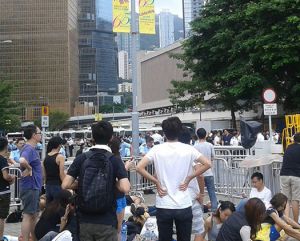“Our parents try to stop us from participating and I lied to my parents, for three days, because they don’t think democracy is good,” second year Hong Kong Baptist University student, Stephanie Chan said. “I didn’t quite share much with them about anything other than that I typed my opinions via Facebook. Perhaps our parents think we are too childish?”

Just like Chan, students in Hong Kong, China are coming together to stand up to their government to receive their promised democratic rights. On Saturday, Oct. 11, students skyped with three students to talk about what is going on in Hong Kong right now.
“In general, protests never happen here, certainly not to this degree. This is significant,” Robert Iodice, former Cabrini engineer and current instructor for theatre practicum who traveled to Hong Kong for a project, said. “Teargas has only been used on the streets of Hong Kong twice in its entire history: once in the mid ‘60s, interestingly to break up leftists from a fledgling pro-communist movement, and a second time in 2006. That’s it. Substantially more tear gas has been expended now than both earlier uses combined and crowds have never been shot with rubber bullets before. This is big.”
Along with Chan her friend Sophie Hong from Hong Kong Baptist University and Donald Tsui from Lingnan University, all three just in their second year about 18-19-years-old, spoke about their involvement within the movement. Speaking with such passion about the change they wish to see for their future government, they talk about this idea of “awaking change.”
“[Older generations] they start to realize that they need to learn about political situation of Hong Kong. Therefore they awaken change,” Hong said. “University students are more united because of this movement.”
Students come together whether that is through the use of social media via WhatsUp App, Facebook, Instagram and Twitter, making posters or signs, taking photos, helping hand out food and water or creating stations for people to charge their cell phones and cameras, this is the epitome of solidarity. No matter where in Hong Kong the protesters were from, where they went to school or what their ethnicity, everyone came together hand in hand to help make a change for one cause.
“I participate in this movement because I think I have to voice my opinion,” Chan said. “Towards this unfair situation of Hong Kong because actually I was not politically conscious two years ago.”
According to the students, the government is saying that the election that they had was unfair.
Tsui is studying social sciences about politics, social policies and sociology in school.

“First we had a class boycott movement, we give up our classes and go to other places to attend another lecture about some democracy lessons or some social lessons. So I came up in this movement to show our concerns, Hong Kong nowadays, the current situation we have to fight to stop the human and universal suffrage,” Tsui said. “So the central government from Beijing have some restrictions student have the responsibility to raise our opinion and complain to the government and show our concerns. So I am here.”
The protests are the main concern of not only the protestors but the police and government because of the backlash and retaliation of what could happen.
“The political system of Hong Kong isn’t full of fairness which cannot fully and truly represent peoples voice,” Chan said.
Because it does not represent peoples voice there is always fear that that retaliation of protesting could become violent.
“I was scared to be arrested on the first day, or before I joined the movement yes because we are doing is something illegal, it is disobedient and the we are giving up some rights of ourselves so that’s why we want to move others,” Hong said. “So I worry about beaten by the police or being arrested, but I think this is price we have to pay in the fight for democracy in Hong Kong.”



